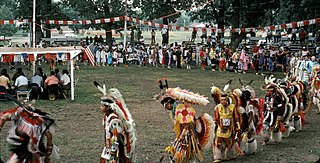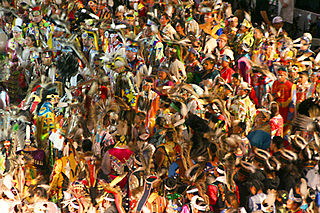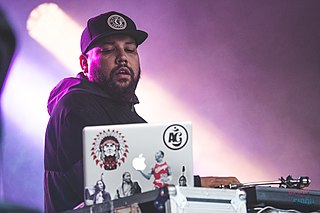E. Donald "Ed" Two-Rivers, sometimes known as Donald Two-River, was an Anishinaabe (Ojibwa) poet, playwright and spoken-word performer.
Brought up first on the reservation and then in the urban Native community in Chicago, Two-Rivers has been an activist for Native rights since the 1970s, for which he was awarded the Iron Eyes Cody Award for Peace in 1992. He is also an accomplished poet, who has, among other honours, been awarded the American Book Award in 1992. A critic of "victim politics", Two-Rivers is a strong supporter of programs that give disadvantaged Native peoples the chance to stand on their own two feet. [1]
He had been critical of Euro-American directors and actors in the past, saying that "I believe that for non-Natives to perform a Native American play, they would first have to undergo a certain level of sensitivity training. In fact, I would require it for any of my plays."
E. Donald Two-Rivers was the founding (Artistic Director) of the Chicago-based Red Path Theater Company.
In 2007, he returned to Chicago, to work on his last book In the Spirit of the Coyote.
He died December 27, 2008. [2]
In 2009, a mosaic inspired by his poem "Indian Land Dancing" was dedicated in the Uptown neighborhood of Chicago. [3]
The Missouria or Missouri are a Native American tribe that originated in the Great Lakes region of what is now the United States before European contact. The tribe belongs to the Chiwere division of the Siouan language family, together with the Ho-Chunk, Winnebago, Iowa, and Otoe.

The Wounded Knee Massacre, also known as the Battle of Wounded Knee, was the deadliest mass shooting in American history, involving nearly three hundred Lakota people shot and killed by soldiers of the United States Army. The massacre, part of what the U.S. military called the Pine Ridge Campaign, occurred on December 29, 1890, near Wounded Knee Creek on the Lakota Pine Ridge Indian Reservation in South Dakota, following a botched attempt to disarm the Lakota camp. The previous day, a detachment of the U.S. 7th Cavalry Regiment commanded by Major Samuel M. Whitside approached Spotted Elk's band of Miniconjou Lakota and 38 Hunkpapa Lakota near Porcupine Butte and escorted them five miles westward to Wounded Knee Creek, where they made camp. The remainder of the 7th Cavalry Regiment, led by Colonel James W. Forsyth, arrived and surrounded the encampment. The regiment was supported by a battery of four Hotchkiss mountain guns. The Army was catering to the anxiety of settlers who called the conflict the Messiah War and were worried the Ghost Dance signified a potentially dangerous Sioux resurgence. Historian Jeffrey Ostler wrote in 2004, "Wounded Knee was not made up of a series of discrete unconnected events. Instead, from the disarming to the burial of the dead, it consisted of a series of acts held together by an underlying logic of racist domination."
Daniel David Moses was a Canadian poet and playwright.

A powwow is a gathering with dances held by many Native American and First Nations communities. Powwows today are an opportunity for Indigenous people to socialize, dance, sing, and honor their cultures. Powwows may be private or public, indoors or outdoors. Dancing events can be competitive with monetary prizes. Powwows vary in length from single-day to weeklong events.
Ray Young Bear is a Meskwaki poet and novelist. He was raised on the Meskwaki Tribal Settlement in Tama County, Iowa. He writes about contemporary Native Americans in English and in Meskwaki. The theme of his poems and other works are Native Americans' search for identity. His poems express the painful awareness of identity loss.

John Trudell was a Native American author, poet, actor, musician, and political activist. He was the spokesperson for the Indians of All Tribes' takeover of Alcatraz beginning in 1969, broadcasting as Radio Free Alcatraz. During most of the 1970s, he served as the chairman of the American Indian Movement, based in Minneapolis, Minnesota.
Saugeen First Nation is an Ojibway First Nation band located along the Saugeen River and Bruce Peninsula in Ontario, Canada. The band states that their legal name is the "Chippewas of Saugeen". Organized in the mid-1970s, Saugeen First Nation is the primary "political successor apparent" to the Chippewas of Saugeen Ojibway Territory; the other First Nation that is a part of Chippewas of Saugeen Ojibway Territory is Cape Croker. The Ojibway are of the Algonquian languages family. The First Nation consist of four reserves: Chief's Point 28, Saugeen 29, Saugeen Hunting Grounds 60A, and Saugeen and Cape Croker Fishing Islands 1.

Paula Gunn Allen was an American poet, literary critic, activist, professor, and novelist. Of mixed-race European-American, Arab-American, and Native American descent, she identified with her mother's people, the Laguna Pueblo. Gunn Allen wrote numerous essays, stories and poetry with Native American and feminist themes, and two biographies of Native American women. She edited four collections of Native American traditional stories and contemporary writing.

(Helen) Diane Glancy is an American poet, author, and playwright.
Wendy Rose is an American writer. Having grown up in an environment which placed little emphasis on both her Native American and white background, much of her verse deals with her search for her personal identity. She is also an anthropologist, artist, and social scientist.

The Gathering of Nations is the largest pow-wow in the United States and North America. It is held annually on the fourth weekend in April, on the Powwow Grounds at Expo NM, in Albuquerque, New Mexico. Over 565 tribes from around the United States and 220 from Canada travel to Albuquerque to participate.

Wild West shows were traveling vaudeville performances in the United States and Europe that existed around 1870–1920. The shows began as theatrical stage productions and evolved into open-air shows that depicted romanticized stereotypes of cowboys, Plains Indians, army scouts, outlaws, and wild animals that existed in the American West. While some of the storylines and characters were based on historical events, others were fictional or sensationalized.
Anna Lee Walters is a Pawnee/Otoe–Missouria author.
Joseph A. Dandurand is a Kwantlen person (Xalatsep) from Kwantlen First Nation in British Columbia. He is a poet, playwright, and archaeologist.

Little Shell Tribe of Chippewa Indians of Montana is a federally recognized tribe of Ojibwe, Métis, and Cree people in Montana. The name of the tribe is often shortened to Little Shell. The current population of enrolled tribal members is approximately 6,800. They have a 35,000-sq. foot office complex in Great Falls.
Denise Low is an American poet, honored as the second Kansas poet laureate (2007–2009). A professor at Haskell Indian Nations University, Low taught literature, creative writing and American Indian studies courses at the university. She was succeeded by Caryn Mirriam-Goldberg on July 1, 2009.

The Halluci Nation, formerly known as A Tribe Called Red, is a Canadian electronic music group who blend instrumental hip hop, reggae, moombahton and dubstep-influenced dance music with elements of First Nations music, particularly vocal chanting and drumming. Based in Ottawa, Ontario, the group consists of Tim "2oolman" Hill, and Ehren "Bear Witness" Thomas. Former members include co-founder DJ Jon Deck and Dan "DJ Shub" General, who left the band for personal reasons in spring 2014, and was replaced by Hill. Co-founder Ian "DJ NDN" Campeau left the band for health reasons in October 2017, with the band opting to remain a duo for the time being.

Alice Azure is an American poet and writer. She is a member of the St. Louis Poetry Center.

DJ Shub is a Mohawk DJ and music producer and member of the Six Nations of the Grand River. He has won numerous awards for his work as a former member of A Tribe Called Red, a DJ, and for solo pursuits.
Willard Earl LaMere was a Native American community organizer and educational leader in Chicago, Illinois in the mid twentieth century, a period when the US government's Indian termination policy encouraged Native Americans to assimilate into mainstream American society. Working to preserve Native American culture and values as Native Americans moved from reservations to cities, LaMere was instrumental in founding, among other organizations, the Native American Educational Services College, which became the first higher education institution in an urban setting managed by and serving Native Americans. He was also the college's first graduate.